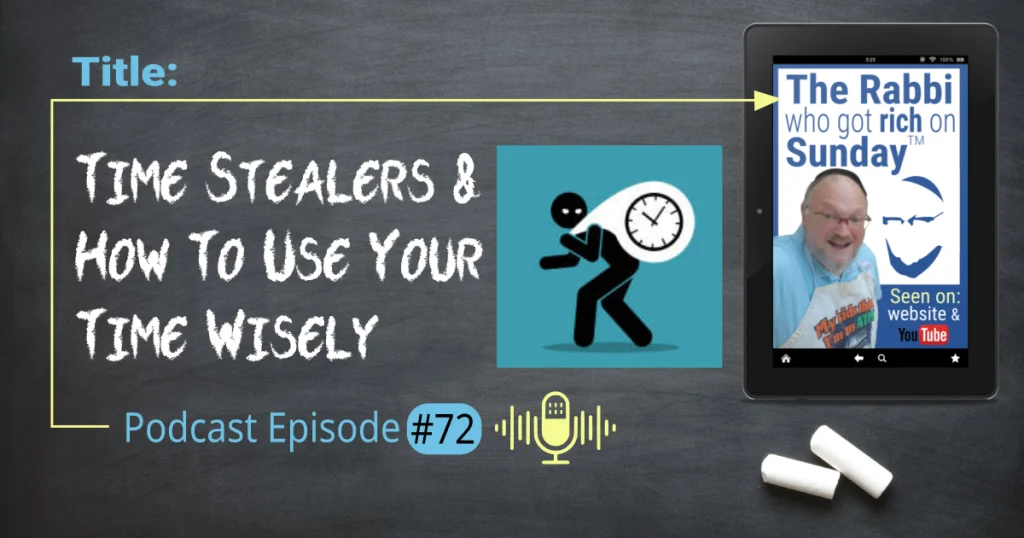Time Stealers & How To Use Your Time Wisely
Podcast Transcript:
This episode shares the fourth of my 10 methods of; .How To Manage Time Effectively.
Time Stealers and How To Use Your Time Wisely
This mini-series is full of tips to manage your time better and to fulfill your life’s purpose. In the transcription of this podcast, you’ll see the link to my website, where you can see more resources.

Do a personal inventory and analyze what you are spending your time on now.
Dorothy had big dreams.
She had just been promoted to be the Membership Director of her local community center.
She and her family had been using the center for years and she had volunteered on all the committees. Even she had always been giving her keen insights on how to increase membership and now she was hired to do something about it.
Moreover, she worked very hard putting in long hours every day, fielding the constant flow of urgent issues, and when the first month was over, she was sure New Member Day was going to be a huge success.
She was shocked when the day passed and there were no new members! However, her boss sat down with her to analyze what she had done and what could be fixed so that next month New Member Day would be more successful.
Dorothy had compiled a list of everyone who had ever used the facility and created reports on frequency of use and the most popular activities.
She added to that list all the people she could find by searching online for people living within a 30-minute drive of the center. Suddenly she analyzed demographics, age, gender and 20 other key factors to determine the likelihood of each family joining the center. She went over the records of people who had been members and stopped.
Also, she did many other activities and had lists and lists. Then she sorted those lists from most likely to least likely. She then planned the best time of day to communicate with each person, although there were many times that were a bad time of day, week, month, or year. However she knew that birthdays, holidays, school days and weekends were not ideal times and she put it all to paper. In addition, she organized a committee of her coworkers and assigned them the people they should contact.
Boy, had she worked hard.
She couldn’t understand why no one had joined!?
Her boss listened to her describe all these activities and the 80 hours a week for a month she had put in and then asked her one question.
“How many new member prospects did you personally talk to or even communicate back and forth with through text or email?”.
That’s when it became clear that in all the urgent matters that needed her attention, the paper shuffling and other hard work, she had missed doing the actual work needed to succeed!
Do you know how you spend your time?
The story I just shared may sound ridiculous. However, I also can’t even count the number of people I’ve consulted who worked very hard with little results and after much analysis we found that they were caught up in a whirlwind of daily urgent tasks that sucked a lot of their time away. When they did the work, they also focused almost exclusively on activities that did not directly move their goals forward which we used to call “paper shuffling.”
People will often think they are working hard.
And they are.
But they avoid what they fear – whether it be making phone calls, going on appointments or asking for the sale.
Avoid the whirlwind – Time wasters
There will always be urgencies demanding your attention. Phone calls and emails to return. Meetings to attend. Paperwork to file.
Franklin Covey calls this the whirlwind that demands your attention.
In future episodes we will learn how to choose which items to pursue and a “magic” formula for dealing with the rest.
Personal inventory list
One of my mentors, McKay Christenson, taught me that when a person is not being successful and they tell you how hard they are working, the first thing to do is to have them write down everything they do as they do it each day for a week.
It is not easy to do, but after a week you will notice that you spend a lot of time on activities that feel productive, but the amount of time you actually spend on the key activities is much much less than you thought.
In a future episode we will also learn how use a weekly schedule in a very creative way to avoid this issue. But as with most things, the first step is doing the hard work to really identify the issues that are in the way between you and your goals.
Personal inventory example
I hope these examples help. If you want more help, just schedule a session with me.
I highly suggest you take this week’s episode to heart and for the next week, write down every activity from sleeping and eating to paperwork and phone calls and how long you did it.
Doing this might sound tedious, but the effect it will have on your long-term success will be profound.
Just do it!
On the other hand in next podcast, we will learn how to “Work Smarter, Not Harder.”
For more guidance and tips on how to live your dream life, go to my website, therabbiwhogotrichonsunday.com to access content-rich articles and more.
You can also access a link through the show notes, if you are listening to this podcast on any of the popular podcast platforms.